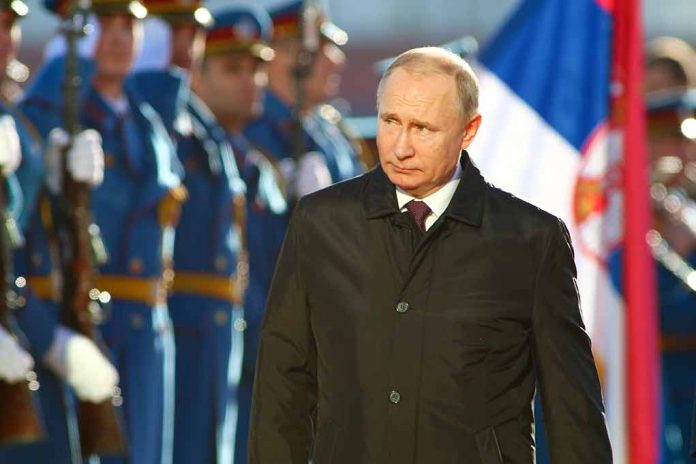
Putin demands end to NATO expansion for peace in Ukraine, revealing his strategic intention to control his own border areas and demonstrating that he holds all the cards in negotiations while Trump grows increasingly frustrated with Russia’s military actions.
Key Takeaways
- Putin is demanding a written guarantee from Western powers that NATO will stop eastward expansion, specifically barring Ukraine, Georgia, and Moldova from membership.
- Russia’s peace conditions include sanctions relief, resolution of frozen Russian assets, and protection for Russian speakers in Ukraine.
- President Trump has warned Putin that he’s “playing with fire” by not seriously engaging in peace talks and threatened further sanctions if Russia continues stalling.
- Putin believes Russia can continue the war for years despite Western sanctions due to Ukraine’s depleted military forces.
- The Kremlin is insisting on maintaining control over four regions in eastern Ukraine, showing little willingness to compromise on territorial claims.
Putin’s Non-Negotiable Demands
Russian President Vladimir Putin has laid out clear conditions for ending the Ukraine war, with NATO expansion being his primary concern. According to multiple sources, Putin is demanding a written pledge from Western leaders to halt NATO’s eastward expansion, specifically preventing Ukraine, Georgia, and Moldova from joining the alliance. This demand strikes at the heart of what Russia has long considered a threat to its national security – the encroachment of Western military infrastructure along its borders. Putin’s insistence on this point reveals his determination to establish a buffer zone between Russia and NATO forces, essentially seeking veto power over Ukraine’s future security arrangements.
In addition to the NATO demands, Putin is seeking significant sanctions relief as part of any peace agreement. The extensive Western sanctions have damaged Russia’s economy, though not to the extent Western leaders had hoped. The Russian leader believes these sanctions must be lifted before a meaningful peace can be established, demonstrating his understanding that economic pressure remains one of the West’s primary leverage points. Putin’s demands also include resolution regarding frozen Russian assets abroad and guarantees of protection for Russian-speaking populations in Ukraine, which he has consistently used as justification for the invasion.
Trump’s Growing Frustration
President Trump has taken an increasingly critical stance toward Putin’s approach to peace negotiations. While campaigning, Trump repeatedly claimed he could end the war quickly, but the reality has proven more complex. Trump has publicly criticized Putin for not seriously engaging in peace talks, stating that the Russian leader is “playing with fire” by continuing military operations while ostensibly participating in negotiations. This strong language represents a shift in tone from Trump, who has historically maintained a cordial rhetorical approach toward the Russian president, and signals growing impatience with Russian intransigence.
“Putin is ready to make peace but not at any price, stated one senior Russian source with knowledge of top-level Kremlin thinking,” acording to The Moscow Times.
Trump has set a two-week timeline to determine if Putin is serious about ending the conflict, suggesting the administration is running out of patience. Despite this frustration, Trump has indicated he is not planning additional sanctions against Russia at this time, believing a deal may be close. This measured approach reflects Trump’s desire to maintain negotiating space while also signaling that American patience has limits. The administration’s statements highlight the delicate balance between maintaining pressure on Russia and providing space for diplomatic resolution.
Russia’s Military Advantage
Putin’s hardening negotiating position comes from a place of perceived military strength. Russian forces have been making steady advances in eastern Ukraine, and Putin reportedly believes Russia can continue the war for years despite Western sanctions. The depletion of Ukraine’s military resources has created a battlefield advantage that strengthens Putin’s hand at the negotiating table. Russian sources indicate that Putin has “toughened his position” on territorial claims, insisting on maintaining control over four regions in eastern Ukraine that Russia has partially occupied and annexed.
“Peace tomorrow will be even more painful,” warned a source familiar with Kremlin thinking, suggesting that delays in reaching an agreement will only result in worse terms for Ukraine and the West,” according to The Moscow Times.
The Kremlin has publicly maintained that any peace deal must address what it calls the conflict’s “root causes,” consistently pointing to NATO expansion as the fundamental issue. Kremlin spokesperson Dmitry Peskov has pushed back against Trump’s criticisms, arguing that the president is not fully informed about the situation, particularly regarding alleged Ukrainian attacks on Russian cities. This public disagreement highlights the challenging path ahead for negotiators, as both sides attempt to frame the conflict according to their preferred narratives while securing their core interests.
Ukraine’s Position
President Zelenskyy and Ukrainian officials have consistently rejected any agreement that would grant Russia veto power over Ukraine’s NATO aspirations. For Kyiv, the right to determine its own security arrangements remains non-negotiable, especially after the Russian invasion demonstrated the consequences of Ukraine’s lack of formal security guarantees. Ukraine continues to seek strong commitments from Western allies to ensure its long-term security, regardless of whether immediate NATO membership is on the table. This fundamental disagreement over Ukraine’s future security status remains perhaps the most significant obstacle to a lasting peace agreement.
“Putin has toughened his position,” noted a second source with knowledge of the Russian negotiating stance, indicating that prospects for meaningful compromise may be diminishing rather than improving.
While Putin has agreed to work on a peace memorandum with Ukraine, Russia is still drafting its version of such an agreement. European governments and Ukrainian officials have accused Moscow of deliberately stalling peace efforts while advancing militarily, suggesting the Kremlin is attempting to improve its negotiating position through battlefield gains. The coming weeks will be critical in determining whether genuine progress toward peace is possible or if the conflict will continue to grind on, with Putin’s demands regarding NATO expansion and sanctions relief remaining at the center of this increasingly complex diplomatic standoff.



